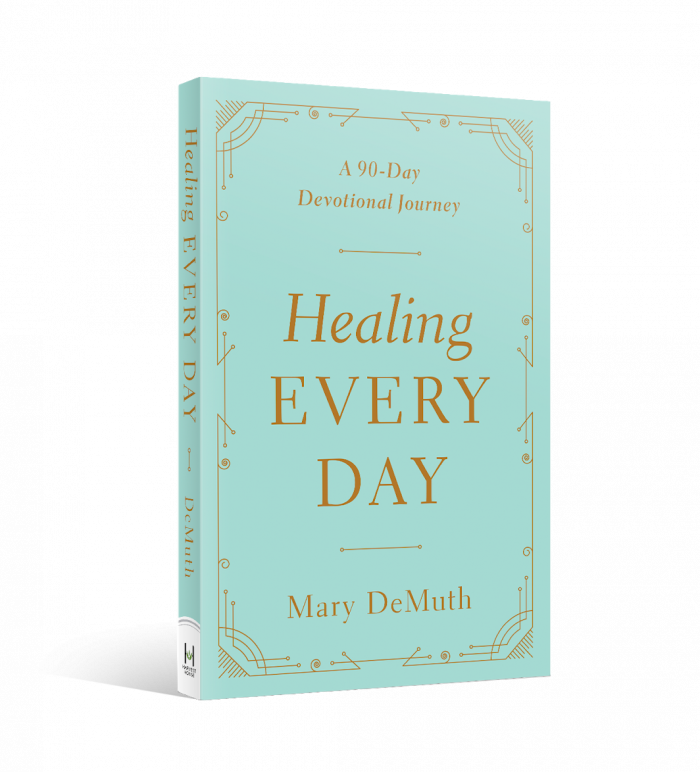
Find Healing for Hurting Hearts
What’s on your New Year’s Resolution list? If your list is a lot like mine, it includes returning to pre-holiday healthier eating habits and making time for exercise several times a week. Those are common resolutions regarding physical fitness. Not so common are resolutions pertaining to our emotional fitness. But I have a book recommendation that might help with your 2020 emotional goals: Healing Every Day: A 90-Day Devotional Journey by Mary DeMuth.

Author, storyteller, and prayer warrior Mary DeMuth experienced devastating abuse in her childhood. Recovering and healing from those experiences was not easy, quick, or painless—but with the power of Jesus—possible.
Perhaps you may or may not have experienced childhood abuse. But we all have experienced hurt at some level—medical anguish, military trauma, broken promises, promotions passed-over, relationships parted, family in tension, and death of loved ones. We live in a post-Genesis-three, broken world and we long for our King’s return to make all things new.
But until He returns, we may not experience healing of our relationships or our physical health, but we can experience healing of our souls. By focusing on a passage of Scripture daily over the course of ninety days, Mary DeMuth takes the sojourner from Genesis to Revelation, applying biblical truths to hurting hearts so that we can grieve and find joy again.
Admittedly, it took me longer than ninety days to finish the book. Some of the devotionals were worth pondering for more than a day. And other days family, sickness, busyness, or simply the normal chaos of life simply got in the way. But I am glad I came back to it, wrapping it up as a new year begins. A few of my take-aways from DeMuth’s devotional are as follows:
- Choose Healing
Jesus saw a paralytic by the pool of Bethesda and asked him an important question, “Do you want to become well?” (John 5:6). DeMuth notes, “We have to ask ourselves the same question because we typically prefer known pain to unknown health.”[1]
- Choose Grief
“Come on now, you need to move past this.” Have you ever had someone say that to you? I have and the statement stopped me in my tracks and dried up my tears, but not because it was helpful advice. I was shocked and appalled that one month after a devastating loss someone could suggest that I should be “past this” by now. I felt like I was not allowed to grieve.
But DeMuth clarifies, “Grieving is not wrong. It is not simple or quick. It is simply part of life on this earth. But even in the midst of it, God has the supernatural ability to help us thrive despite the grief. That is good news, friend.” [2]
Later on in her devotional she expands on this point by stating, “In this present church era, the tendency we’ve seen is to limit grief. People are simply not comfortable with it, so they minimize it in themselves and others. They’ve forgotten that true life change comes in the midst of grief, and that growth often only comes in the midst of suffering.”[3]
- Choose Trustworthy People
Of course, in order to be allowed to grieve, you need to find trustworthy people, and in my experience, that number will be few. DeMuth explains that surrounding yourself with trustworthy people is an important part of your healing process, and “you’ll discover more freedom if you find trustworthy people who will bear the weight of your story alongside you.”[4] Those who you think should bear the weight might not. But ask God for those people, and He will provide them.
- Choose Reorientation
This challenge of reorientation might feel like a smack in the face (by the Holy Spirit), but it is so needed. Making time for appropriate grief is understandable and required, but there is a point when we have to consider if we are still grieving or just rehashing.
DeMuth challenges the reader by stating, “It’s time to reconsider what we worship. We are worshipping something (or a memory) when we spend time rehashing it, when we give it space in our minds, when we dwell on it ad infinitum… To grow in our healing journey, we have to reorient our minds toward the one who is worthy of being dwelt on. God deserves the space we give him in our minds. Instead of rehearsing and reliving our past, let’s remember the power of God. Let’s worship him with everything.”[5]
This is quite a challenge, but an important one. However if you’ve surrounded yourself with trustworthy people, they will provide a safe place to be vulnerable and ask whether or not it’s time to reorient.
- Choose Weakness
I’m a task-oriented, recovering perfectionist. (Ok, perhaps not recovering.) So admitting that I’m weak is not any easy thing for me to do. Perhaps you can relate. DeMuth writes, “I’m not sure when we decided that to be a Christ follower, we had to live up to certain expectations of strength, with-it-ness, or personal holiness.”[6]
But Christ knows that despite the show we might put on for others (and ourselves), we are weak—yet he loves us anyway. Is it not freeing to know that? It is for me.
- Choose Forgiveness
Forgiveness is not the same as reconciliation. You cannot have reconciliation without forgiveness. But you can have forgiveness without reconciliation. Reconciliation requires more than one party to be involved. Forgiveness requires just you (and the Lord.) To be free and to move forward in healing, forgiveness is required. DeMuth makes this powerful point, “When you hold on to unforgiveness, you created a bond with that perpetrator. Forgiveness is the hacksaw that cuts the bond.”[7]
Forgiveness is freeing—yet hard—but possible and Mary explains, it is “fueled by your own interaction with Jesus.” [8]
(Please note, when it comes to situations of abuse, reconciliation is probably not safe and I suggest getting a professional counselor involved.)
- Choose the Right Reasons
In the acknowledgements Mary DeMuth dedicates this book to her kids, explaining that they are the reasons she “pursued healing in the first place.” What are your reasons?
My reasons for healing have changed throughout the years, depending on the situation. But my current reasons are my son, my husband, and my witness as a disciple-maker for the Lord.
DeMuth gives us this challenge: “Be hurt; be healed; become a healer.” [9]
As you make your New Year’s resolutions, why not choose emotional and spiritual health? Write down your reasons, share them with your trustworthy people, and this year choose healing.
You can follow Mary Demuth’s Restory ministry here.
Her Healing Every Day devotional can be found at Amazon, Barnes & Noble, and elsewhere.
[1] Mary E. DeMuth, Healing Every Day: A 90-Day Devotional Journey (Eugene: Harvest House Publishers, 2019), 12.
[2] Ibid., 13.
[3] Ibid., 57.
[4] Ibid., 17.
[5] Ibid., 19.
[6] Ibid., 141.
[7] Ibid., 157.
[8] Ibid., 156.
[9] Ibid., 55.



